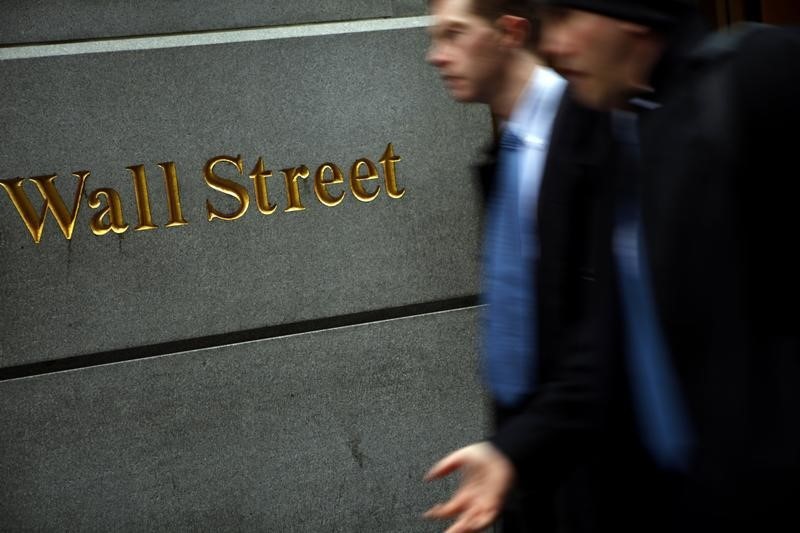Investing.com -- U.S. stock futures edged up on Thursday, after a negative start to 2024 for equities on Wall Street carried over into a second straight session. Markets were little surprised by minutes from the Federal Reserve's latest meeting, which dampened already ebbing hopes that the central bank would begin to cut interest early this year. Elsewhere, a U.S. labor agency accuses rocket company SpaceX of unlawfully dismissing workers who raised concerns over social media statements made by founder Elon Musk.
1. Futures inch higher
U.S. stock futures pointed into the green on Thursday, with investors looking ahead to fresh labor market data this week and digesting minutes from the Federal Reserve's latest policy meeting.
By 04:57 ET (09:57 GMT), the Dow futures contract had added 37 points or 0.1%, S&P 500 futures had climbed by 5 points or 0.1%, and Nasdaq 100 futures had risen by 31 points or 0.2%.
The main averages on Wall Street all closed lower in the prior session, as a dismal start to the new year for equities extended into a second day. The benchmark S&P 500 and 30-stock Dow Jones Industrial Average both slipped by 0.8%, while the tech-heavy Nasdaq Composite dropped by 1.2% -- its fourth straight negative session.
Stocks are coming off a solid 2023 performance, including a late-year rally that was driven in part by hopes that signs of easing inflation in the U.S. may persuade the Fed to soon begin stepping away from an aggressive series of rate hikes. The central bank's December meeting, at which officials at the central bank unveiled a more dovish outlook than previous projections, helped feed this enthusiasm.
2. Fed minutes appear to temper early rate cut enthusiasm
Minutes from the Fed's gathering last month has seemingly poured cold water on much of the optimism, although analysts noted that the release on Wednesday did not have a major impact on markets.
The account showed that while policymakers believed rates were "as likely at or near [their] peak," there was still an "unusually elevated" amount of uncertainty lingering around the U.S. economy heading into 2024.
Officials at the rate-setting Federal Open Market Committee (FOMC) also suggested that more evidence would likely be necessary to confirm that inflation was sustainably moving down towards their stated 2% target. Quelling sticky price pressures has been the central focus of a long-standing tightening cycle by the Fed that has pushed borrowing costs up to more than two-decade highs.
"[T]here is a broad consensus that inflation will decline, but also that the FOMC will keep rates high in case of more persistent price pressures," analysts at ING said in a note.
On Thursday, monthly private payrolls data may provide fresh insight into the U.S. jobs picture, which the Fed has identified as a possible fuel source for inflation. The figures will serve as a precursor to the publication of the all-important December non-farm payrolls report on Friday.
3. SpaceX illegally fired workers critical of Musk, U.S. labor agency says
SpaceX illegally fired eight workers for distributing a letter calling founder Elon Musk a "frequent source of distraction and embarrassment," according to a complaint issued by a U.S. labor agency.
A regional official with the National Labor Relations Board said that the rocket and satellite company violated federal labor law protecting employees' rights to call for better working conditions.
The letter, which was sent to SpaceX executives in 2022, argued that a series of tweets by Musk did not align with the firm's diversity and workplace misconduct policies. They also encouraged SpaceX to speak out against the social media posts.
The employees were subsequently interrogated over the letter, the complaint claimed, while other workers were threatened with dismissals if they voiced similar concerns. The NLRB, which is tasked with protecting collective bargaining rights, said it would seek a settlement prior to a scheduled court hearing on March 5.
SpaceX did not immediately respond to a request for comment from Reuters, the news agency reported.
4. Fitch downgrades four Chinese national asset managers
Fitch said on Thursday it had downgraded the issuer default ratings (IDRs) of four Chinese national asset management companies and flagged more potential downgrades on expectations of weaker government support and headwinds from a property market slump.
The ratings agency lowered the IDRs of China Cinda Asset Management and China Orient Asset Management to ‘A-’ from ‘A’, and the ratings of China Huarong Asset Management and China Great Wall (HK:2333) Asset Management were cut to ‘BBB’ from ‘BBB+’.
Fitch also left China Cinda’s outlook at ‘stable’, while the other three asset managers were placed on Rating Watch Negative, a move that potentially heralds a further downgrade to their IDRs. The ratings agency said it was awaiting financial results for end-2023 to gauge whether there was any further deterioration.
Fitch noted that the downgrade was driven by increased uncertainty over possible government support for China’s major national asset managers, along with a change in the criteria under which it viewed their standalone credit profiles.
5. Oil rises amid Middle East supply worries
Oil prices rose Thursday, adding to the previous session’s sharp gains on continued concerns over supply from the Middle East.
By 09:58 ET, the U.S. crude futures traded 1.0% higher at $73.44 per barrel, while the Brent contract climbed 0.8% to $78.85 a barrel.
Both contracts surged around 3% on Wednesday after protests over high fuel prices caused Libya’s El Sahara oil field to halt production, with the field producing about 300,000 barrels per day. The news came as worries persist over Yemen's Iran-backed Houthis targeting shipping in the Red Sea.
The market was also supported by data from the American Petroleum Institute, which showed that U.S. crude stocks fell by a bigger-than-expected 7.4 million barrels last week. Official numbers from the Energy Information Administration are due later Thursday.
